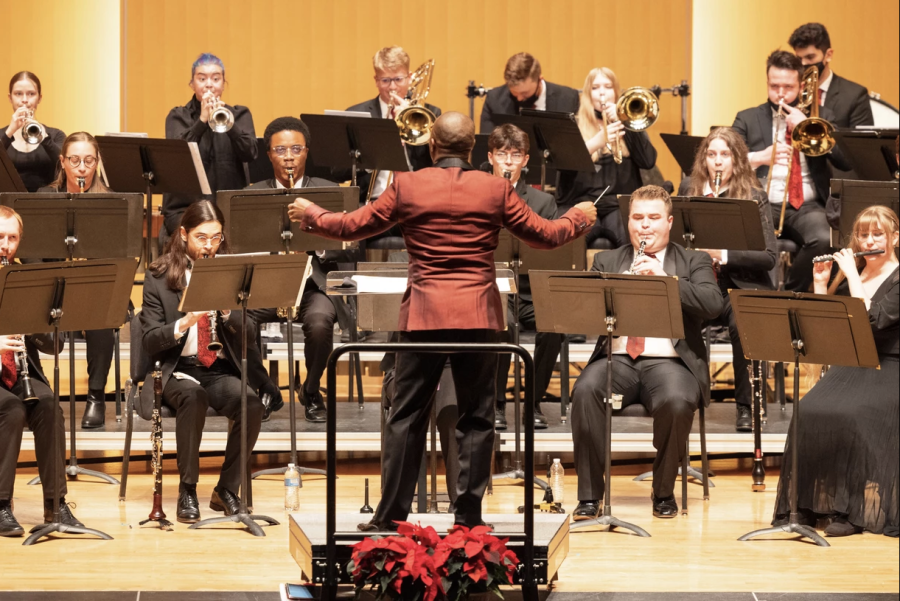Meet T André Feagin, the director of CWU bands
January 12, 2022
Surrounded by his students, colleagues, the mayor and the city council of El Paso, Texas on Nov. 1, 2011, T André Feagin stood in his bright orange blazer with a smile. As people spoke about his contributions to the University of Texas at El Paso marching band, the city’s local government sought to commemorate his work by declaring that day as “Professor T André Feagin Day.”
Ten years later, Feagin is the director of bands at CWU. He currently administrates CWU’s three wind bands as well as the school’s marching and basketball pep bands. He also serves as a member of the Leadership Cohort within the College of Arts and Humanities and the diversity and inclusivity committee for the university.
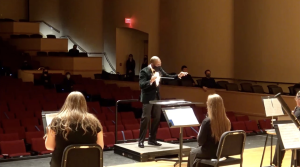
As the first Black band director in the history of CWU, Faegin said he comes “into the job with a unique perspective because of who I am and because of who I am. The nature of my worldview on music is slightly different because I too have spent a great deal of my time invested in thinking about music and culture that was pretty narrow-viewed.”
Before arriving at CWU, he served as the Associate Director of Bands at Colorado State University. His secondary teaching experience was with Watkins Overton High School for the Creative and Performing Arts in Tennessee.
Feagin received his doctorate in Musical Arts specializing in wind band conducting from the University of Arizona Fred Fox School of Music, studying under Professor Gregg I. Hanson. In a memoriam post on his website, Feagin stated that Hanson “saw me, he valued me, and heard me in a way unlike any other in my life.”
Pushing Back Against Eurocentricity
When Feagin first arrived at CWU, the students in the music department had recently begun discussions about the representation of marginalized populations in the repertoire they perform, as well as pushing back against the Eurocentricity of the music curriculum. Feagin agreed with those efforts. “What we need, period, are things that are going to unite and connect us.”
“Our country itself is an adaptation of Eurocentric ideas,” said Feagin. “It is not surprising— maybe even sometimes disappointing … that we are who we are, because I remember where we came from.”
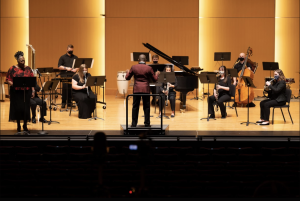
CWU is a “very old institution,” but should be given a “little bit of credit” as there have been some positive changes that emphasize diversity and inclusion.
“I think let’s just call the elephant in the room,” he said. “I’m some of my students’ first Black teacher.” He said he hopes to “help the university in its mission of creating a welcoming environment for students of underrepresented and other diverse populations.”
After the murder of George Floyd in May of 2020, Feagin said he believes “we’re in a better place and space” to have “meaningful conversations and meaningful dialogue” regarding inequality and injustice. He said that he is glad that there are now more people “screaming from the mountaintops.”
An Open Perspective
For Feagin, however, these conversations have never been in the background for him.
“It has always been at the forefront of my thought process of inequality and injustice as it relates to not only policing and administration at that level, but the education system, societal norms,” he said. “All of those things have been uniquely, always at the front of my mind.”
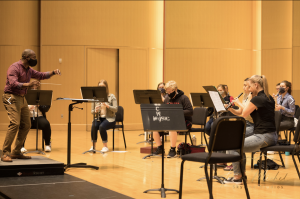
Regarding his primary goals as a music educator, Feagin said that creating curiosity should be of the utmost importance, especially when preparing future music educators. He said he wants to challenge his students and himself to open up and celebrate the differences that “make us so much greater as a whole.”
“When I think about sitting here across this desk right now, thinking about how many Blacks in the country are teaching at predominantly white institutions in the position that I have, I can count them all on one and a half hands, and it’s 2021,” Feagin said. “And sometimes when these ideas are out of sight, they are out of mind. So, to some, I didn’t exist. I didn’t see another me when I was growing up. And I certainly didn’t see it when I got to college.”
Feagin is consistent with his own personal goals as an educator and his desires for the educators that he is preparing.
“Push me out of an airplane, and I can go with a worldly open perspective,” Feagin said. “That is what I want my band students to experience.”
Inclusion and Curiosity
“The one thing I love about being a musician and an artist is the idea that it is commonplace for me to invite cultures in, not to shut them out,” Feagin said. “And the idea that sometimes the curriculum, even by nature of it not been designed that way, will sometimes act as a model of exclusion instead of inclusion.”
It is clear that Feagin looks for curiosity and creativity over perfection. He asks what a curriculum can do to become a foundation that creates curiosity.
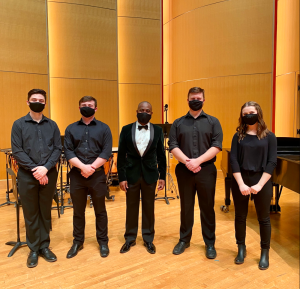
Regardless of the position that Feagin is put in, he said that he will always bear the role of turning CWU into a “destination place for those underrepresented populations while creating a culture of inclusion and belonging in this very building.”
Feagin has traveled around the country, seeing a wide variety of different demographics and cultures. With this experience, he said he wants to set up his students to thrive in any community, regardless of how similar it is to their own culture.
“Whether I’m teaching in an inner-city school in Memphis, which I’ve been-there-done-that,” Feagin said, “or I’m teaching in the second largest Mexican American population in the United States, been-there-done-that, now I’m at a place where the population of my intersection is only 3.4%. The goal is that I can just teach anywhere.”


